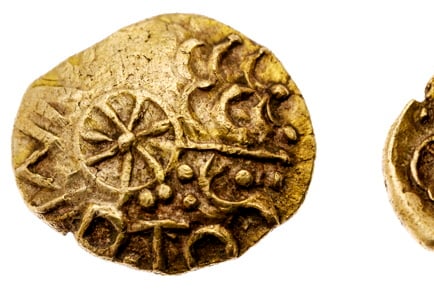The name of a new Iron Age English ruler or king has been discovered on a coin found in a Hampshire field.
Dating from around 50 BC the gold coin is stamped with the name Esunertos, a previously unrecorded Iron Age ruler.
The find has been described by experts as "one of the outstanding discoveries of recent decades".
The coin, around the size of a fingernail, was dug up by a metal detector in a farmer's field in March this year.
Neither the finder or the site have been disclosed.
The coin bears the name and it dates to the very beginning of written language appearing in the British Isles.
It was struck sometime between 50 and 30 BC, shortly after Julius Caesar's first Roman raid of Britain in 55 BC.
He landed on the Kent coast from a fleet of ships carrying 20,000 Roman soldiers.
Waiting for them on the beach were thousands of Celtic warriors but the Romans were forced to return home after struggling to land and rough seas wrecking their boats.
Caesar e returned the following year with 50,000 soldiers defeating many tribes and marched all the way to the River Thames.
But after three months of fighting, they left to stop a rebellion in Gaul.
The long-term settlement of Britain by Rome didn't occur until 43 AD when Claudius was emperor.
Leading Iron Age experts have since studied the coin and deduced it to be struck by a pre-eminent male figure dubbed ‘IISVNIRTOS’ whose name translates as ‘Mighty as the God Esos’.
One theory is that he possibly ruled as King from nearby Danebury Hill fort.
Dr John Sills of the Celtic Coin Index at the Ashmolean Museum said: "It is one of the outstanding discoveries of recent decades in Celtic numismatics."
Gregory Edmund, Iron Age Coin Specialist at auctioneers Spink who led the team of experts in the recording of this new find added: “This fabulous piece of prehistoric artwork completes the mental image we have when we think of Iron Age Britain – the war horse and chariot.
"But it also surprises us with the appearance of classical languages like Latin.
“This is the reason I come to work; to document the discoveries of national importance and share that knowledge directly with museums and amongst academics, collectors and the public at large."
Mr Edmund continued: “On a personal note, this find is particularly vindicating for me.
"I focused my university degree on the Roman invasion of Britain through the lens of Britain’s first coinage.
"To now add a critically important contemporary witness to those seismic events in the birth of our island’s story is electrifying.
“Despite the coin’s diminutive size, the name of its conceiver – Esunertos – now truly echoes down the ages”
The coin is scheduled for sale at Spink, on Thursday, September 28 where it is expected to fetch at least £4,000.
By Jim Leffman (SWNS)




-Cllr-Lulu-Bowerman-Tim-Lawton--Image-LDRs.jpeg?width=209&height=140&crop=209:145,smart&quality=75)
Comments
This article has no comments yet. Be the first to leave a comment.